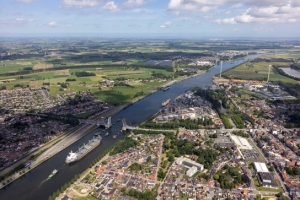


(Posted on 27/06/23)
Belgium and the Netherlands have outlined plans for the transport and storage of CO2 between Belgium and the Netherlands. This first step is important if the industry in North Sea Port is to reduce CO2 emissions by half by 2030 and be climate neutral by 2050.
Belgium and the Netherlands have signed a Memorandum of Understanding on capturing, transporting and storing carbon dioxide (CO2) from industrial processes and power plants that make use of fossil fuels. This process begins with the capture of CO2 emissions, after which the gas is safely transported to suitable storage sites, such as rock formations deep underground or empty oil and gas fields.There the CO2 is permanently stored, preventing it from entering the atmosphere and contributing to the greenhouse effect. An important technology for large-scale use in the short term. An important technology to reduce CO2 emissions on a large scale in the short term. As electrification, the use of renewable hydrogen and the reuse of CO2 increase, permanent storage of CO2 will become less necessary.
Empty gas fields in the North Sea are suitable for storing this CO2. Prior to doing so, arrangements had to be made for the cross-border transport of CO2. In accordance with the 'London Protocol', these are now being put in place by means of a Memorandum of Understanding. This bilateral agreement sets out the conditions that must be met to allow transport between the two countries. It also nominates the national authorities responsible for issuing the necessary permits for transportation.
"Various companies in the port area will be investing in CO2 terminals and pipeline infrastructure." – Daan Schalck, CEO North Sea Port
Daan Schalck, CEO North Sea Port: "The bilateral agreement between Belgium and the Netherlands moves the collaborative projects in the cross-border port forwards. Companies will start capturing and storing CO2 instead of emitting it before 2030. Various companies in the port area are investing in CO2 terminals and pipeline infrastructure. Pipeline transport is clearly the most attractive option. This agreement represents an important first step in establishing the necessary cross-border infrastructure. North Sea Port is ready to take the next step and help facilitate cross-border cooperation, so bringing the achievement of a climate-neutral port and the European climate goals one step closer."
The Memorandum of Understanding setting out the practical arrangements for the transport and storage of CO2 was signed as part of the Dutch state visit to Belgium from 20-22 June. The agreement was signed by Belgian Minister of the North Sea Vincent Van Quickenborne, Flemish Minister of Environment and Energy Zuhal Demir, Walloon Minister of Climate and Energy Philippe Henry and Dutch Minister of Economic Affairs and Climate Micky Adriaansens.
With this year’s Rail Conference “Rail Freight Transport and Seaports”, a joint initiative... Read more
Asian Bulk Logistics (ABL Group) and ICG have jointly announced the successful completion of ABL&rsquo... Read more
Abu Dhabi based AD Ports Group, a leading global enabler of integrated trade, industry and logistics... Read more
The Executive Board of Hamburger Hafen und Logistik AG (HHLA) has appointed Patrick Krawutschke as Managing... Read more
Abu Dhabi based AD Ports Group, a global enabler of integrated trade, transport, industry, and logistics... Read more
This year marks a significant milestone in maritime innovation as Port Hedland, Australia, celebrates... Read more
Associated British Ports (ABP), the UK’s leading port operator, has announced the latest tranche... Read more
During the Investment, Labour, and Trade Promotion Programme in Japan (November 16–22, 2025),... Read more
AD Ports Group subsidiary Khalifa Economic Zones Abu Dhabi - KEZAD Group, the largest operator of integrated... Read more
Abu Dhabi based AD Ports Group, a global enabler of integrated trade, transport, industry, and logistics... Read more